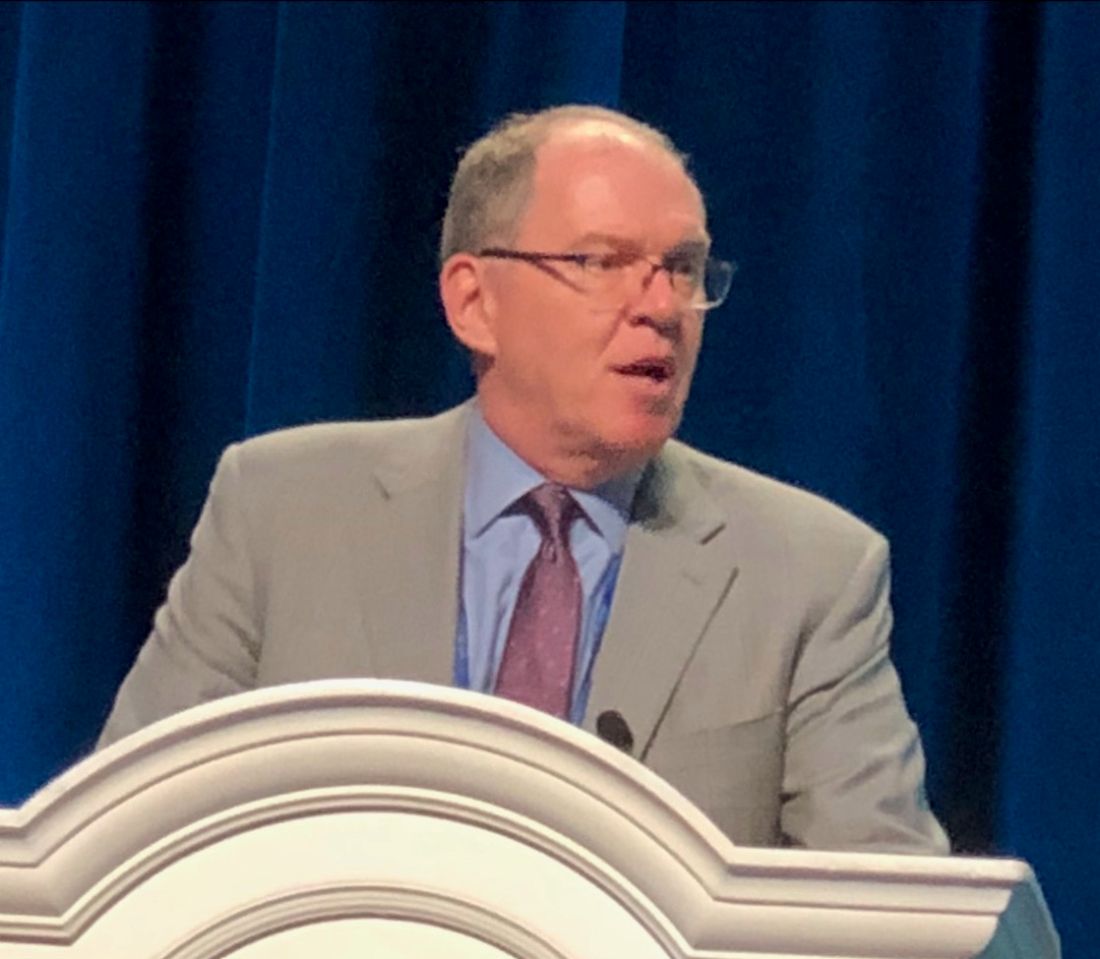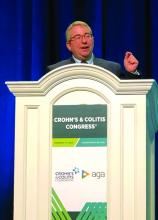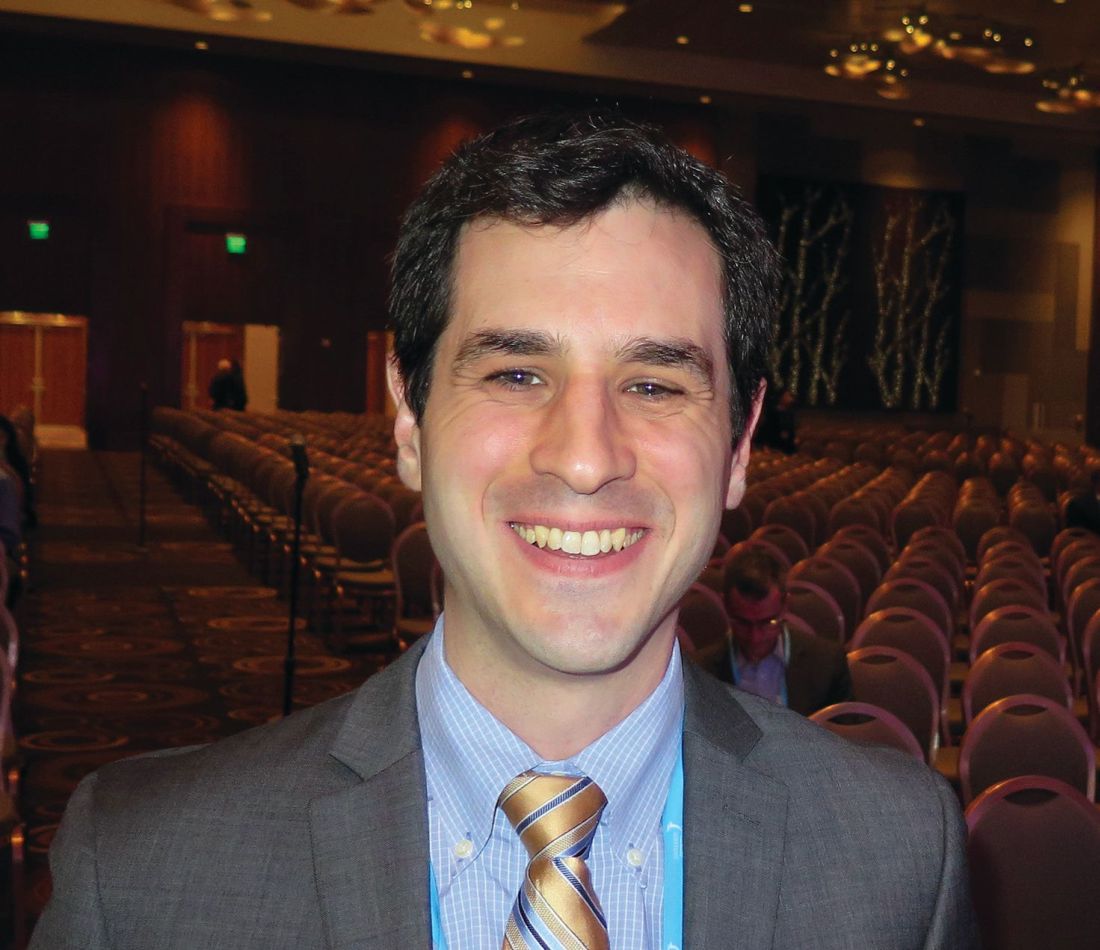User login
Which biologic is best in Crohn’s? Jury’s still out
LAS VEGAS – Biologics have dramatically improved the treatment of Crohn’s disease (CD), an influential gastroenterologist told colleagues, but there is still no clear evidence suggesting which ones are best as first-line treatments.
When it comes to making a choice, insurer policies may play a role, said Gary R. Lichtenstein, MD, lead author of the American College of Gastroenterology’s 2018 treatment guidelines for CD. Otherwise, “you’re left with clinical factors, your own judgment, and some indirect data,” said Dr. Lichtenstein, professor of medicine at the University of Pennsylvania, Philadelphia, who spoke about the guidelines in a presentation at the Crohn’s & Colitis Congress – a partnership of the Crohn’s & Colitis Foundation and the American Gastroenterological Association.
Dr. Lichtenstein spoke about recommendations regarding treatment of CD in several areas. The following is a summary of some points he made:
Diagnosis: Some tests aren’t recommended
Classic signs and symptoms of CD include abdominal pain, diarrhea, fatigue, weight loss, failure to grow, anemia, and manifestations outside the intestines. Fecal calprotectin testing is recommended to differentiate inflammatory bowel disease from irritable bowel syndrome; genetic testing and serologic markers are not recommended for diagnosis.
Ileocolonoscopy is recommended for diagnosis and provides details about severity. Several factors suggest higher risk of progressive disease: Young age at diagnosis, initial extensive bowel involvement, perianal/severe rectal disease, and penetrating or stenosing phenotype at diagnosis.
Research is hinting that visceral adiposity may be a risk factor too, Dr. Lichtenstein said, adding that “the greater the number of poor prognostic factors, the worse the likelihood of needing a colectomy.”
Focus of treatment: Don’t just consider symptoms
For patients with moderate to severe disease, guidelines now suggest that physicians not just focus on symptoms but also consider endoscopic signs of response and healing. Guidelines also recommend paying attention to quality of life and levels of stress, anxiety, and depression.
Drug therapy: Biologics stand apart
Budesonide is appropriate for induction therapy in mild to moderate CD. There are many possible treatments for moderate to severe disease, including steroids for induction and thiopurines or methotrexate for maintenance
But biologics stand apart, Dr. Lichtenstein said, noting that “they have really been the mainstay of the treatment of our moderate to severe patients.”
Still, he cautioned that tumor necrosis factor (TNF) inhibitors are linked to a variety of adverse effects, including demyelination, heart failure, auto-immunity, infusion reactions, immunogenicity, infection, bone marrow suppression, and cancer. Specifically, the risk of lymphoma and melanoma may go up, although the absolute risk is low.
He added that a third of patients will not respond to TNF inhibitors, and about half of those who do respond may stop responding after a few years.
Among newer drugs, vedolizumab (Entyvio) is useful as an induction and maintenance drug in CD. “We recognize it has a slow onset of action,” Dr. Lichtenstein said. “Waiting is part of what one needs to do. Those who had prior anti-TNF failures are less likely to respond than those who have been anti-TNF naive.”
The drug has a favorable safety profile, he said.
Ustekinumab (Stelara) also has a favorable safety profile with very low infection risk, although Dr. Lichtenstein said he expects that the drug will be linked to a small increased risk of cancer. “Perhaps I’ll be wrong,” he said, “but time will tell.”
So which biologic is best? Direct head-to-head trials are lacking, Dr. Lichtenstein said. However, a 2018 systematic review and network meta-analysis analyzed clinical trial data and came to these conclusions: Infliximab (Remicade) and adalimumab (Humira) are best for induction of remission in biologic-naive patients; adalimumab and ustekinumab are best for induction of remission in TNF inhibitor–exposed patients; adalimumab and infliximab are best for maintenance of remission; and ustekinumab and infliximab are best in terms of lowest risk of adverse events or infection (Aliment Pharmacol Ther. 2018 Aug;48[4]:394-409).
Dr. Lichtenstein reports many disclosures with multiple drugmakers, including both grants/research support and consulting relationships with Celgene, Janssen Biotech, Salix, Shire, UCB and Warner Chilcott.
LAS VEGAS – Biologics have dramatically improved the treatment of Crohn’s disease (CD), an influential gastroenterologist told colleagues, but there is still no clear evidence suggesting which ones are best as first-line treatments.
When it comes to making a choice, insurer policies may play a role, said Gary R. Lichtenstein, MD, lead author of the American College of Gastroenterology’s 2018 treatment guidelines for CD. Otherwise, “you’re left with clinical factors, your own judgment, and some indirect data,” said Dr. Lichtenstein, professor of medicine at the University of Pennsylvania, Philadelphia, who spoke about the guidelines in a presentation at the Crohn’s & Colitis Congress – a partnership of the Crohn’s & Colitis Foundation and the American Gastroenterological Association.
Dr. Lichtenstein spoke about recommendations regarding treatment of CD in several areas. The following is a summary of some points he made:
Diagnosis: Some tests aren’t recommended
Classic signs and symptoms of CD include abdominal pain, diarrhea, fatigue, weight loss, failure to grow, anemia, and manifestations outside the intestines. Fecal calprotectin testing is recommended to differentiate inflammatory bowel disease from irritable bowel syndrome; genetic testing and serologic markers are not recommended for diagnosis.
Ileocolonoscopy is recommended for diagnosis and provides details about severity. Several factors suggest higher risk of progressive disease: Young age at diagnosis, initial extensive bowel involvement, perianal/severe rectal disease, and penetrating or stenosing phenotype at diagnosis.
Research is hinting that visceral adiposity may be a risk factor too, Dr. Lichtenstein said, adding that “the greater the number of poor prognostic factors, the worse the likelihood of needing a colectomy.”
Focus of treatment: Don’t just consider symptoms
For patients with moderate to severe disease, guidelines now suggest that physicians not just focus on symptoms but also consider endoscopic signs of response and healing. Guidelines also recommend paying attention to quality of life and levels of stress, anxiety, and depression.
Drug therapy: Biologics stand apart
Budesonide is appropriate for induction therapy in mild to moderate CD. There are many possible treatments for moderate to severe disease, including steroids for induction and thiopurines or methotrexate for maintenance
But biologics stand apart, Dr. Lichtenstein said, noting that “they have really been the mainstay of the treatment of our moderate to severe patients.”
Still, he cautioned that tumor necrosis factor (TNF) inhibitors are linked to a variety of adverse effects, including demyelination, heart failure, auto-immunity, infusion reactions, immunogenicity, infection, bone marrow suppression, and cancer. Specifically, the risk of lymphoma and melanoma may go up, although the absolute risk is low.
He added that a third of patients will not respond to TNF inhibitors, and about half of those who do respond may stop responding after a few years.
Among newer drugs, vedolizumab (Entyvio) is useful as an induction and maintenance drug in CD. “We recognize it has a slow onset of action,” Dr. Lichtenstein said. “Waiting is part of what one needs to do. Those who had prior anti-TNF failures are less likely to respond than those who have been anti-TNF naive.”
The drug has a favorable safety profile, he said.
Ustekinumab (Stelara) also has a favorable safety profile with very low infection risk, although Dr. Lichtenstein said he expects that the drug will be linked to a small increased risk of cancer. “Perhaps I’ll be wrong,” he said, “but time will tell.”
So which biologic is best? Direct head-to-head trials are lacking, Dr. Lichtenstein said. However, a 2018 systematic review and network meta-analysis analyzed clinical trial data and came to these conclusions: Infliximab (Remicade) and adalimumab (Humira) are best for induction of remission in biologic-naive patients; adalimumab and ustekinumab are best for induction of remission in TNF inhibitor–exposed patients; adalimumab and infliximab are best for maintenance of remission; and ustekinumab and infliximab are best in terms of lowest risk of adverse events or infection (Aliment Pharmacol Ther. 2018 Aug;48[4]:394-409).
Dr. Lichtenstein reports many disclosures with multiple drugmakers, including both grants/research support and consulting relationships with Celgene, Janssen Biotech, Salix, Shire, UCB and Warner Chilcott.
LAS VEGAS – Biologics have dramatically improved the treatment of Crohn’s disease (CD), an influential gastroenterologist told colleagues, but there is still no clear evidence suggesting which ones are best as first-line treatments.
When it comes to making a choice, insurer policies may play a role, said Gary R. Lichtenstein, MD, lead author of the American College of Gastroenterology’s 2018 treatment guidelines for CD. Otherwise, “you’re left with clinical factors, your own judgment, and some indirect data,” said Dr. Lichtenstein, professor of medicine at the University of Pennsylvania, Philadelphia, who spoke about the guidelines in a presentation at the Crohn’s & Colitis Congress – a partnership of the Crohn’s & Colitis Foundation and the American Gastroenterological Association.
Dr. Lichtenstein spoke about recommendations regarding treatment of CD in several areas. The following is a summary of some points he made:
Diagnosis: Some tests aren’t recommended
Classic signs and symptoms of CD include abdominal pain, diarrhea, fatigue, weight loss, failure to grow, anemia, and manifestations outside the intestines. Fecal calprotectin testing is recommended to differentiate inflammatory bowel disease from irritable bowel syndrome; genetic testing and serologic markers are not recommended for diagnosis.
Ileocolonoscopy is recommended for diagnosis and provides details about severity. Several factors suggest higher risk of progressive disease: Young age at diagnosis, initial extensive bowel involvement, perianal/severe rectal disease, and penetrating or stenosing phenotype at diagnosis.
Research is hinting that visceral adiposity may be a risk factor too, Dr. Lichtenstein said, adding that “the greater the number of poor prognostic factors, the worse the likelihood of needing a colectomy.”
Focus of treatment: Don’t just consider symptoms
For patients with moderate to severe disease, guidelines now suggest that physicians not just focus on symptoms but also consider endoscopic signs of response and healing. Guidelines also recommend paying attention to quality of life and levels of stress, anxiety, and depression.
Drug therapy: Biologics stand apart
Budesonide is appropriate for induction therapy in mild to moderate CD. There are many possible treatments for moderate to severe disease, including steroids for induction and thiopurines or methotrexate for maintenance
But biologics stand apart, Dr. Lichtenstein said, noting that “they have really been the mainstay of the treatment of our moderate to severe patients.”
Still, he cautioned that tumor necrosis factor (TNF) inhibitors are linked to a variety of adverse effects, including demyelination, heart failure, auto-immunity, infusion reactions, immunogenicity, infection, bone marrow suppression, and cancer. Specifically, the risk of lymphoma and melanoma may go up, although the absolute risk is low.
He added that a third of patients will not respond to TNF inhibitors, and about half of those who do respond may stop responding after a few years.
Among newer drugs, vedolizumab (Entyvio) is useful as an induction and maintenance drug in CD. “We recognize it has a slow onset of action,” Dr. Lichtenstein said. “Waiting is part of what one needs to do. Those who had prior anti-TNF failures are less likely to respond than those who have been anti-TNF naive.”
The drug has a favorable safety profile, he said.
Ustekinumab (Stelara) also has a favorable safety profile with very low infection risk, although Dr. Lichtenstein said he expects that the drug will be linked to a small increased risk of cancer. “Perhaps I’ll be wrong,” he said, “but time will tell.”
So which biologic is best? Direct head-to-head trials are lacking, Dr. Lichtenstein said. However, a 2018 systematic review and network meta-analysis analyzed clinical trial data and came to these conclusions: Infliximab (Remicade) and adalimumab (Humira) are best for induction of remission in biologic-naive patients; adalimumab and ustekinumab are best for induction of remission in TNF inhibitor–exposed patients; adalimumab and infliximab are best for maintenance of remission; and ustekinumab and infliximab are best in terms of lowest risk of adverse events or infection (Aliment Pharmacol Ther. 2018 Aug;48[4]:394-409).
Dr. Lichtenstein reports many disclosures with multiple drugmakers, including both grants/research support and consulting relationships with Celgene, Janssen Biotech, Salix, Shire, UCB and Warner Chilcott.
EXPERT ANALYSIS FROM CROHN’S & COLITIS CONGRESS
Consider therapeutic drug monitoring in stubborn IBD cases
LAS VEGAS – An estimated 10%-30% of patients with inflammatory bowel disease (IBD) don’t respond to biologics, leaving physicians with a big question: What now? Evidence suggests the best strategy is an approach grounded in therapeutic drug monitoring, appropriate disease monitoring, and other strategies, a gastroenterologist told colleagues.
“We can’t look at any one of these tools in isolation,” said Edward V. Loftus Jr., MD, professor of medicine at the Mayo Clinic in Rochester, Minn. He spoke about a reactive approach to stubborn cases of IBD at the annual congress of the Crohn’s & Colitis Foundation and the American Gastroenterological Association.
Dr. Loftus offered several tips and tidbits about managing IBD, especially when patients fail to appropriately respond to biologics.
- Many other conditions can cause symptoms that may appear to suggest lack of response to medication in IBD. These can include celiac disease, bacterial overgrowth, bile salt diarrhea, irritable bowel syndrome, hypersensitivity colitis, short bowel syndrome, and carbohydrate malabsorption. As a result, “before you make big changes in biologics or immunomodulators, make sure you’re actually confirming the presence of inflammation,” Dr. Loftus advised. Appropriate tests may be a colonoscopy/ileoscopy, CT or MR enterography, or a simple fecal calprotectin test; he also recommended that physicians exclude complications such as stricture, fistula, and abscess.
- The definition of lack of response in IBD has evolved over the years, Dr. Loftus said. The definition ideally refers to clinical response after an appropriate time period, such as 14 weeks of treatment (infliximab) or 8-12 weeks of treatment (injectable anti–tumor necrosis factor [TNF] drugs).
- Factors linked to primary nonresponse include disease duration of 2 years or more, smoking, and elevated C-reactive protein.
- Secondary lack of response – when drugs lose effectiveness over time even though they previously were effective – is common in IBD, with research suggesting it may affect about 20% of patients on infliximab or adalimumab.
- When patients fail to fully respond to a therapeutic level of an anti-TNF drug, research suggests it may be more effective to switch to another one rather than increase the dose, Dr. Loftus said.
- In cases of secondary lack of response in patients taking anti-TNF drugs, AGA guidelines suggest therapeutic drug monitoring may be appropriate, Dr. Loftus said. However, the AGA doesn’t make any recommendations regarding therapeutic drug monitoring in cases where IBD is dormant while patients are on anti-TNF drugs.
- Research suggests that a treat-to-target approach – designed to reach specific testing targets – may boost the effectiveness of therapeutic drug monitoring, Dr. Loftus said, and algorithm-based treatment might be even better.
“Therapeutic drug management in isolation will only get you so far,” he advised. “But don’t be confused. The drug level is not the target. The absence of inflammation is the target.”
Dr. Loftus reported recent relationships (research support and consultant) with multiple drugmakers, including AbbVie, Bristol-Myers Squibb, Pfizer, Gilead, Celgene, Eli Lilly, and several others.
LAS VEGAS – An estimated 10%-30% of patients with inflammatory bowel disease (IBD) don’t respond to biologics, leaving physicians with a big question: What now? Evidence suggests the best strategy is an approach grounded in therapeutic drug monitoring, appropriate disease monitoring, and other strategies, a gastroenterologist told colleagues.
“We can’t look at any one of these tools in isolation,” said Edward V. Loftus Jr., MD, professor of medicine at the Mayo Clinic in Rochester, Minn. He spoke about a reactive approach to stubborn cases of IBD at the annual congress of the Crohn’s & Colitis Foundation and the American Gastroenterological Association.
Dr. Loftus offered several tips and tidbits about managing IBD, especially when patients fail to appropriately respond to biologics.
- Many other conditions can cause symptoms that may appear to suggest lack of response to medication in IBD. These can include celiac disease, bacterial overgrowth, bile salt diarrhea, irritable bowel syndrome, hypersensitivity colitis, short bowel syndrome, and carbohydrate malabsorption. As a result, “before you make big changes in biologics or immunomodulators, make sure you’re actually confirming the presence of inflammation,” Dr. Loftus advised. Appropriate tests may be a colonoscopy/ileoscopy, CT or MR enterography, or a simple fecal calprotectin test; he also recommended that physicians exclude complications such as stricture, fistula, and abscess.
- The definition of lack of response in IBD has evolved over the years, Dr. Loftus said. The definition ideally refers to clinical response after an appropriate time period, such as 14 weeks of treatment (infliximab) or 8-12 weeks of treatment (injectable anti–tumor necrosis factor [TNF] drugs).
- Factors linked to primary nonresponse include disease duration of 2 years or more, smoking, and elevated C-reactive protein.
- Secondary lack of response – when drugs lose effectiveness over time even though they previously were effective – is common in IBD, with research suggesting it may affect about 20% of patients on infliximab or adalimumab.
- When patients fail to fully respond to a therapeutic level of an anti-TNF drug, research suggests it may be more effective to switch to another one rather than increase the dose, Dr. Loftus said.
- In cases of secondary lack of response in patients taking anti-TNF drugs, AGA guidelines suggest therapeutic drug monitoring may be appropriate, Dr. Loftus said. However, the AGA doesn’t make any recommendations regarding therapeutic drug monitoring in cases where IBD is dormant while patients are on anti-TNF drugs.
- Research suggests that a treat-to-target approach – designed to reach specific testing targets – may boost the effectiveness of therapeutic drug monitoring, Dr. Loftus said, and algorithm-based treatment might be even better.
“Therapeutic drug management in isolation will only get you so far,” he advised. “But don’t be confused. The drug level is not the target. The absence of inflammation is the target.”
Dr. Loftus reported recent relationships (research support and consultant) with multiple drugmakers, including AbbVie, Bristol-Myers Squibb, Pfizer, Gilead, Celgene, Eli Lilly, and several others.
LAS VEGAS – An estimated 10%-30% of patients with inflammatory bowel disease (IBD) don’t respond to biologics, leaving physicians with a big question: What now? Evidence suggests the best strategy is an approach grounded in therapeutic drug monitoring, appropriate disease monitoring, and other strategies, a gastroenterologist told colleagues.
“We can’t look at any one of these tools in isolation,” said Edward V. Loftus Jr., MD, professor of medicine at the Mayo Clinic in Rochester, Minn. He spoke about a reactive approach to stubborn cases of IBD at the annual congress of the Crohn’s & Colitis Foundation and the American Gastroenterological Association.
Dr. Loftus offered several tips and tidbits about managing IBD, especially when patients fail to appropriately respond to biologics.
- Many other conditions can cause symptoms that may appear to suggest lack of response to medication in IBD. These can include celiac disease, bacterial overgrowth, bile salt diarrhea, irritable bowel syndrome, hypersensitivity colitis, short bowel syndrome, and carbohydrate malabsorption. As a result, “before you make big changes in biologics or immunomodulators, make sure you’re actually confirming the presence of inflammation,” Dr. Loftus advised. Appropriate tests may be a colonoscopy/ileoscopy, CT or MR enterography, or a simple fecal calprotectin test; he also recommended that physicians exclude complications such as stricture, fistula, and abscess.
- The definition of lack of response in IBD has evolved over the years, Dr. Loftus said. The definition ideally refers to clinical response after an appropriate time period, such as 14 weeks of treatment (infliximab) or 8-12 weeks of treatment (injectable anti–tumor necrosis factor [TNF] drugs).
- Factors linked to primary nonresponse include disease duration of 2 years or more, smoking, and elevated C-reactive protein.
- Secondary lack of response – when drugs lose effectiveness over time even though they previously were effective – is common in IBD, with research suggesting it may affect about 20% of patients on infliximab or adalimumab.
- When patients fail to fully respond to a therapeutic level of an anti-TNF drug, research suggests it may be more effective to switch to another one rather than increase the dose, Dr. Loftus said.
- In cases of secondary lack of response in patients taking anti-TNF drugs, AGA guidelines suggest therapeutic drug monitoring may be appropriate, Dr. Loftus said. However, the AGA doesn’t make any recommendations regarding therapeutic drug monitoring in cases where IBD is dormant while patients are on anti-TNF drugs.
- Research suggests that a treat-to-target approach – designed to reach specific testing targets – may boost the effectiveness of therapeutic drug monitoring, Dr. Loftus said, and algorithm-based treatment might be even better.
“Therapeutic drug management in isolation will only get you so far,” he advised. “But don’t be confused. The drug level is not the target. The absence of inflammation is the target.”
Dr. Loftus reported recent relationships (research support and consultant) with multiple drugmakers, including AbbVie, Bristol-Myers Squibb, Pfizer, Gilead, Celgene, Eli Lilly, and several others.
EXPERT ANALYSIS FROM THE CROHN’S & COLITIS CONGRESS
Experts: Consider enteral therapy in CD, with caveats
LAS VEGAS – Temporarily switching to an enteral diet – without solid food – has the potential to reverse Crohn’s disease (CD), especially in children, a panel of experts told gastroenterologists here.
They acknowledged the controversial treatment requires strict adherence and can be impossible for some patients to tolerate. But it can be successful too, said gastroenterologist Lindsey G. Albenberg, DO, of Children’s Hospital of Philadelphia, where enteral nutrition therapy (ENT) is commonly used in patients with CD.
“Parents are obviously thrilled that there’s no exposure to immunosuppressive medications,” she said in a discussion about ENT at the Crohn’s & Colitis Congress - a partnership of the Crohn’s & Colitis Foundation and the American Gastroenterological Association. “Typically, we provide 80%-90% of calorie needs through a polymeric formula by mouth. If we see clinical response at 4-6 weeks or even earlier, then we will pursue a course of about 8-12 weeks.”
Research into the best role for ENT therapy in CD is limited. A 2018 Cochrane Library review found there’s “very low quality evidence” suggesting that ENT is better than steroids to induce remission in children. It also found there’s “very low quality evidence” that steroids are better than ENT in adults with CD (Cochrane Database Syst Rev. 2018 Apr 1. doi: 10.1002/14651858.CD000542.pub3).
According to clinician-scientist James D. Lewis, MD, MSCE, of the University of Pennsylvania, Philadelphia, ENT “has gotten a bad name in some ways because of a meta-analysis showing it was inferior to corticosteroids to induce remission.” In fact, he said, studies “didn’t look at mucosal healing and pooled together adults and children.”
In children, he said, the treatment seems to clearly be effective. The picture is less promising in adults. “Presumably that’s because those of you who are parents probably have more control over your young children than your own behavior,” he said, referring to management of food intake.
In adults, “there’s no reason to think it wouldn’t work,” he said. “But trying to convince adults to give up food is really challenging.”
Children who try ENT are often required to use a nasogastric feeding tube, an approach that adults tend to avoid. In kids, “it’s a question of knowing your patient,” said gastroenterologist David Suskind, MD, of Seattle Children’s Hospital. “If the patient says, ‘There’s no way you’ll put a nasal gastric tube in, and no way I will drink it [the ENT supplement],’ this may not be the best therapy. If they’re interested, we push forward. We get much better efficacy because the patients will do what we’re asking.”
Several panelists recommended that patients use polymeric formulations instead of elemental formulations because they’re more palatable. It can be a struggle, however, to stick with the treatment.
Kelly Issokson, MS, RD, CNSC, a dietitian with Cedars-Sinai Medical Center in Los Angeles, tried an ENT therapy for 30 days in order to understand what patients experience and said it was “very challenging.”
“When you sit down to a meal, you anticipate it, you start to salivate. With shakes, it was a lot more clinical,” she said. “The other thing I struggled with was texture and having it be so sweet. I’d freeze [the shakes] into ice cube trays and popsicles. That helped break the monotony. It changes the flavor and cuts the sweetness.”
Ms. Issokson urges her patients to stick with ENT for the entire period of therapy. “Studies show when patients introduce real foods the efficacy of inducing remission goes down. We recommend 100% calories and proteins coming from the formula,” she said. That means “no coffee, no broth, no tea, no nothing but the formula. Most of our patients are able to do that exclusively.”
Toward the end of therapy, around week 8 or 11, some patients tell her they crave food like soup. “I say OK, have a tiny bit,” she said, “but remember, this is only temporary. We’re almost at the end. Try to be 100% exclusive.”
Dr. Albenberg and Dr. Suskind report no disclosures. Ms. Issokson reports consulting fees (speaking and teaching) from AGA, Crohn’s & Colitis Foundation, Academy of Nutrition and Dietetics, and United Ostomy Association. Dr. Lewis reports many relationships – including consulting fees, ownership interest, and grant/research support – with Eli Lilly, Bristol‐Myers Squibb, Gilead, and others.
Correction, 2/22/19: An earlier version of this article misidentified the person in the first photo above.
LAS VEGAS – Temporarily switching to an enteral diet – without solid food – has the potential to reverse Crohn’s disease (CD), especially in children, a panel of experts told gastroenterologists here.
They acknowledged the controversial treatment requires strict adherence and can be impossible for some patients to tolerate. But it can be successful too, said gastroenterologist Lindsey G. Albenberg, DO, of Children’s Hospital of Philadelphia, where enteral nutrition therapy (ENT) is commonly used in patients with CD.
“Parents are obviously thrilled that there’s no exposure to immunosuppressive medications,” she said in a discussion about ENT at the Crohn’s & Colitis Congress - a partnership of the Crohn’s & Colitis Foundation and the American Gastroenterological Association. “Typically, we provide 80%-90% of calorie needs through a polymeric formula by mouth. If we see clinical response at 4-6 weeks or even earlier, then we will pursue a course of about 8-12 weeks.”
Research into the best role for ENT therapy in CD is limited. A 2018 Cochrane Library review found there’s “very low quality evidence” suggesting that ENT is better than steroids to induce remission in children. It also found there’s “very low quality evidence” that steroids are better than ENT in adults with CD (Cochrane Database Syst Rev. 2018 Apr 1. doi: 10.1002/14651858.CD000542.pub3).
According to clinician-scientist James D. Lewis, MD, MSCE, of the University of Pennsylvania, Philadelphia, ENT “has gotten a bad name in some ways because of a meta-analysis showing it was inferior to corticosteroids to induce remission.” In fact, he said, studies “didn’t look at mucosal healing and pooled together adults and children.”
In children, he said, the treatment seems to clearly be effective. The picture is less promising in adults. “Presumably that’s because those of you who are parents probably have more control over your young children than your own behavior,” he said, referring to management of food intake.
In adults, “there’s no reason to think it wouldn’t work,” he said. “But trying to convince adults to give up food is really challenging.”
Children who try ENT are often required to use a nasogastric feeding tube, an approach that adults tend to avoid. In kids, “it’s a question of knowing your patient,” said gastroenterologist David Suskind, MD, of Seattle Children’s Hospital. “If the patient says, ‘There’s no way you’ll put a nasal gastric tube in, and no way I will drink it [the ENT supplement],’ this may not be the best therapy. If they’re interested, we push forward. We get much better efficacy because the patients will do what we’re asking.”
Several panelists recommended that patients use polymeric formulations instead of elemental formulations because they’re more palatable. It can be a struggle, however, to stick with the treatment.
Kelly Issokson, MS, RD, CNSC, a dietitian with Cedars-Sinai Medical Center in Los Angeles, tried an ENT therapy for 30 days in order to understand what patients experience and said it was “very challenging.”
“When you sit down to a meal, you anticipate it, you start to salivate. With shakes, it was a lot more clinical,” she said. “The other thing I struggled with was texture and having it be so sweet. I’d freeze [the shakes] into ice cube trays and popsicles. That helped break the monotony. It changes the flavor and cuts the sweetness.”
Ms. Issokson urges her patients to stick with ENT for the entire period of therapy. “Studies show when patients introduce real foods the efficacy of inducing remission goes down. We recommend 100% calories and proteins coming from the formula,” she said. That means “no coffee, no broth, no tea, no nothing but the formula. Most of our patients are able to do that exclusively.”
Toward the end of therapy, around week 8 or 11, some patients tell her they crave food like soup. “I say OK, have a tiny bit,” she said, “but remember, this is only temporary. We’re almost at the end. Try to be 100% exclusive.”
Dr. Albenberg and Dr. Suskind report no disclosures. Ms. Issokson reports consulting fees (speaking and teaching) from AGA, Crohn’s & Colitis Foundation, Academy of Nutrition and Dietetics, and United Ostomy Association. Dr. Lewis reports many relationships – including consulting fees, ownership interest, and grant/research support – with Eli Lilly, Bristol‐Myers Squibb, Gilead, and others.
Correction, 2/22/19: An earlier version of this article misidentified the person in the first photo above.
LAS VEGAS – Temporarily switching to an enteral diet – without solid food – has the potential to reverse Crohn’s disease (CD), especially in children, a panel of experts told gastroenterologists here.
They acknowledged the controversial treatment requires strict adherence and can be impossible for some patients to tolerate. But it can be successful too, said gastroenterologist Lindsey G. Albenberg, DO, of Children’s Hospital of Philadelphia, where enteral nutrition therapy (ENT) is commonly used in patients with CD.
“Parents are obviously thrilled that there’s no exposure to immunosuppressive medications,” she said in a discussion about ENT at the Crohn’s & Colitis Congress - a partnership of the Crohn’s & Colitis Foundation and the American Gastroenterological Association. “Typically, we provide 80%-90% of calorie needs through a polymeric formula by mouth. If we see clinical response at 4-6 weeks or even earlier, then we will pursue a course of about 8-12 weeks.”
Research into the best role for ENT therapy in CD is limited. A 2018 Cochrane Library review found there’s “very low quality evidence” suggesting that ENT is better than steroids to induce remission in children. It also found there’s “very low quality evidence” that steroids are better than ENT in adults with CD (Cochrane Database Syst Rev. 2018 Apr 1. doi: 10.1002/14651858.CD000542.pub3).
According to clinician-scientist James D. Lewis, MD, MSCE, of the University of Pennsylvania, Philadelphia, ENT “has gotten a bad name in some ways because of a meta-analysis showing it was inferior to corticosteroids to induce remission.” In fact, he said, studies “didn’t look at mucosal healing and pooled together adults and children.”
In children, he said, the treatment seems to clearly be effective. The picture is less promising in adults. “Presumably that’s because those of you who are parents probably have more control over your young children than your own behavior,” he said, referring to management of food intake.
In adults, “there’s no reason to think it wouldn’t work,” he said. “But trying to convince adults to give up food is really challenging.”
Children who try ENT are often required to use a nasogastric feeding tube, an approach that adults tend to avoid. In kids, “it’s a question of knowing your patient,” said gastroenterologist David Suskind, MD, of Seattle Children’s Hospital. “If the patient says, ‘There’s no way you’ll put a nasal gastric tube in, and no way I will drink it [the ENT supplement],’ this may not be the best therapy. If they’re interested, we push forward. We get much better efficacy because the patients will do what we’re asking.”
Several panelists recommended that patients use polymeric formulations instead of elemental formulations because they’re more palatable. It can be a struggle, however, to stick with the treatment.
Kelly Issokson, MS, RD, CNSC, a dietitian with Cedars-Sinai Medical Center in Los Angeles, tried an ENT therapy for 30 days in order to understand what patients experience and said it was “very challenging.”
“When you sit down to a meal, you anticipate it, you start to salivate. With shakes, it was a lot more clinical,” she said. “The other thing I struggled with was texture and having it be so sweet. I’d freeze [the shakes] into ice cube trays and popsicles. That helped break the monotony. It changes the flavor and cuts the sweetness.”
Ms. Issokson urges her patients to stick with ENT for the entire period of therapy. “Studies show when patients introduce real foods the efficacy of inducing remission goes down. We recommend 100% calories and proteins coming from the formula,” she said. That means “no coffee, no broth, no tea, no nothing but the formula. Most of our patients are able to do that exclusively.”
Toward the end of therapy, around week 8 or 11, some patients tell her they crave food like soup. “I say OK, have a tiny bit,” she said, “but remember, this is only temporary. We’re almost at the end. Try to be 100% exclusive.”
Dr. Albenberg and Dr. Suskind report no disclosures. Ms. Issokson reports consulting fees (speaking and teaching) from AGA, Crohn’s & Colitis Foundation, Academy of Nutrition and Dietetics, and United Ostomy Association. Dr. Lewis reports many relationships – including consulting fees, ownership interest, and grant/research support – with Eli Lilly, Bristol‐Myers Squibb, Gilead, and others.
Correction, 2/22/19: An earlier version of this article misidentified the person in the first photo above.
EXPERT ANALYSIS FROM THE CROHN’S & COLITIS CONGRESS
Cochrane/IBD review roundup: Limited evidence keeps verdicts at bay
LAS VEGAS – Cochrane Library reviews of studies into inflammatory bowel disease (IBD) from 2018 revealed limited evidence – so far – to support enteral nutrition therapy (EN) and cannabis in Crohn’s disease (CD) and fecal transplantation in IBD.

But Morris Gordon, MBChB, MMed, PhD, a Cochrane Library researcher who provided a roundup for colleagues, said there’s tremendous opportunity to build upon existing research in these areas.
Dr. Gordon, a pediatrician with a special gastric interest at the University of Central Lancashire in Preston, England, spoke at the Crohn’s & Colitis Congress - a partnership of the Crohn’s & Colitis Foundation and the American Gastroenterological Association.
In his presentation, Dr. Gordon discussed several Cochrane Library reviews published in 2018 in these topic areas:
Enteral therapy
EN was a hot topic at the Crohn’s & Colitics Congress, which devoted a large panel discussion to the benefits of its use in inducing remission in CD, especially in children.
However, an updated 2018 Cochrane Library systematic review found that “very low quality evidence suggests that corticosteroid therapy may be more effective than EN for induction of clinical remission in adults with active CD. Very low quality evidence also suggests that EN may be more effective than steroids for induction of remission in children with active CD” (Cochrane Database Syst Rev. 2018 Apr 1. doi: 10.1002/14651858.CD000542.pub3).
The review recommended that “EN should be considered in pediatric CD patients or in adult patients who can comply with nasogastric tube feeding or perceive the formulations to be palatable, or when steroid side effects are not tolerated or better avoided.”
Another 2018 Cochrane Library Review concluded that “no firm conclusions regarding the efficacy and safety of enteral nutrition in quiescent CD can be drawn” (Cochrane Database Syst Rev. 2018 Aug 11. doi: 10.1002/14651858.CD005984.pub3).
Dr. Gordon noted that IBD guidelines support EN to induce CD remission in children, and he called for “high quality research” to provide more evidence to support this recommendation.
Cannabis
In regard to cannabis, Dr. Gordon referred to a 2018 Cochrane review that examined three studies that investigated its use in CD and determined “the effects of cannabis and cannabis oil on Crohn’s disease are uncertain” (Cochrane Database Syst Rev. 2018 Nov 8. doi: 10.1002/14651858.CD012853.pub2).
He said future studies should focus on the effect of cannabis on quality of life and pain reduction. “That’s where the research needs to go,” he said.
Another 2018 Cochrane review examined two small studies exploring the use of cannabis in ulcerative colitis and reported similar findings, declaring that “the effects of cannabis and cannabidiol on UC are uncertain” (Cochrane Database Syst Rev. 2018 Nov 8. doi: 10.1002/14651858.CD012954.pub2).
Fecal transplantation
The Cochrane Library also examined research into fecal transplantation for IBD. A 2018 review reported that “fecal microbiota transplantation may increase the proportion of participants achieving clinical remission in UC. However, the number of identified studies was small and the quality of evidence was low. There is uncertainty about the rate of serious adverse events. As a result, no solid conclusions can be drawn at this time” (Cochrane Database Syst Rev. 2018 Nov 13. doi: 10.1002/14651858.CD012774.pub2).
Still, Dr. Gordon said, fecal transplantation is “really promising.”
Another 2018 Cochrane review of IBD research – this one focusing on natalizumab (Tysabri) as a tool for induction of remission of CD – was more conclusive. It examined five trials and found that “high quality data suggest that natalizumab is effective for induction of clinical remission and response in some patients with moderately to severely active CD”(Cochrane Database Syst Rev. 2018 Aug 1. doi: 10.1002/14651858.CD006097.pub3).
However, the review noted that none of the studies was high powered enough to detect rare serious adverse effects such as progressive multifocal leukoencephalopathy (PML). “Due to the association with PML, and the availability of alternative agents that are not associated with PML, natalizumab is not likely to be used in patients who fail currently available medical therapy,” the reviewers wrote. “Further studies of natalizumab are not likely to be done.”
Dr. Gordon reports unrestricted travel grants over the past 3 years from Ferring, Synergy, Tillotts, and BioGaia. He holds a National Institute for Health Research Cochrane IBD Program Grant.
LAS VEGAS – Cochrane Library reviews of studies into inflammatory bowel disease (IBD) from 2018 revealed limited evidence – so far – to support enteral nutrition therapy (EN) and cannabis in Crohn’s disease (CD) and fecal transplantation in IBD.

But Morris Gordon, MBChB, MMed, PhD, a Cochrane Library researcher who provided a roundup for colleagues, said there’s tremendous opportunity to build upon existing research in these areas.
Dr. Gordon, a pediatrician with a special gastric interest at the University of Central Lancashire in Preston, England, spoke at the Crohn’s & Colitis Congress - a partnership of the Crohn’s & Colitis Foundation and the American Gastroenterological Association.
In his presentation, Dr. Gordon discussed several Cochrane Library reviews published in 2018 in these topic areas:
Enteral therapy
EN was a hot topic at the Crohn’s & Colitics Congress, which devoted a large panel discussion to the benefits of its use in inducing remission in CD, especially in children.
However, an updated 2018 Cochrane Library systematic review found that “very low quality evidence suggests that corticosteroid therapy may be more effective than EN for induction of clinical remission in adults with active CD. Very low quality evidence also suggests that EN may be more effective than steroids for induction of remission in children with active CD” (Cochrane Database Syst Rev. 2018 Apr 1. doi: 10.1002/14651858.CD000542.pub3).
The review recommended that “EN should be considered in pediatric CD patients or in adult patients who can comply with nasogastric tube feeding or perceive the formulations to be palatable, or when steroid side effects are not tolerated or better avoided.”
Another 2018 Cochrane Library Review concluded that “no firm conclusions regarding the efficacy and safety of enteral nutrition in quiescent CD can be drawn” (Cochrane Database Syst Rev. 2018 Aug 11. doi: 10.1002/14651858.CD005984.pub3).
Dr. Gordon noted that IBD guidelines support EN to induce CD remission in children, and he called for “high quality research” to provide more evidence to support this recommendation.
Cannabis
In regard to cannabis, Dr. Gordon referred to a 2018 Cochrane review that examined three studies that investigated its use in CD and determined “the effects of cannabis and cannabis oil on Crohn’s disease are uncertain” (Cochrane Database Syst Rev. 2018 Nov 8. doi: 10.1002/14651858.CD012853.pub2).
He said future studies should focus on the effect of cannabis on quality of life and pain reduction. “That’s where the research needs to go,” he said.
Another 2018 Cochrane review examined two small studies exploring the use of cannabis in ulcerative colitis and reported similar findings, declaring that “the effects of cannabis and cannabidiol on UC are uncertain” (Cochrane Database Syst Rev. 2018 Nov 8. doi: 10.1002/14651858.CD012954.pub2).
Fecal transplantation
The Cochrane Library also examined research into fecal transplantation for IBD. A 2018 review reported that “fecal microbiota transplantation may increase the proportion of participants achieving clinical remission in UC. However, the number of identified studies was small and the quality of evidence was low. There is uncertainty about the rate of serious adverse events. As a result, no solid conclusions can be drawn at this time” (Cochrane Database Syst Rev. 2018 Nov 13. doi: 10.1002/14651858.CD012774.pub2).
Still, Dr. Gordon said, fecal transplantation is “really promising.”
Another 2018 Cochrane review of IBD research – this one focusing on natalizumab (Tysabri) as a tool for induction of remission of CD – was more conclusive. It examined five trials and found that “high quality data suggest that natalizumab is effective for induction of clinical remission and response in some patients with moderately to severely active CD”(Cochrane Database Syst Rev. 2018 Aug 1. doi: 10.1002/14651858.CD006097.pub3).
However, the review noted that none of the studies was high powered enough to detect rare serious adverse effects such as progressive multifocal leukoencephalopathy (PML). “Due to the association with PML, and the availability of alternative agents that are not associated with PML, natalizumab is not likely to be used in patients who fail currently available medical therapy,” the reviewers wrote. “Further studies of natalizumab are not likely to be done.”
Dr. Gordon reports unrestricted travel grants over the past 3 years from Ferring, Synergy, Tillotts, and BioGaia. He holds a National Institute for Health Research Cochrane IBD Program Grant.
LAS VEGAS – Cochrane Library reviews of studies into inflammatory bowel disease (IBD) from 2018 revealed limited evidence – so far – to support enteral nutrition therapy (EN) and cannabis in Crohn’s disease (CD) and fecal transplantation in IBD.

But Morris Gordon, MBChB, MMed, PhD, a Cochrane Library researcher who provided a roundup for colleagues, said there’s tremendous opportunity to build upon existing research in these areas.
Dr. Gordon, a pediatrician with a special gastric interest at the University of Central Lancashire in Preston, England, spoke at the Crohn’s & Colitis Congress - a partnership of the Crohn’s & Colitis Foundation and the American Gastroenterological Association.
In his presentation, Dr. Gordon discussed several Cochrane Library reviews published in 2018 in these topic areas:
Enteral therapy
EN was a hot topic at the Crohn’s & Colitics Congress, which devoted a large panel discussion to the benefits of its use in inducing remission in CD, especially in children.
However, an updated 2018 Cochrane Library systematic review found that “very low quality evidence suggests that corticosteroid therapy may be more effective than EN for induction of clinical remission in adults with active CD. Very low quality evidence also suggests that EN may be more effective than steroids for induction of remission in children with active CD” (Cochrane Database Syst Rev. 2018 Apr 1. doi: 10.1002/14651858.CD000542.pub3).
The review recommended that “EN should be considered in pediatric CD patients or in adult patients who can comply with nasogastric tube feeding or perceive the formulations to be palatable, or when steroid side effects are not tolerated or better avoided.”
Another 2018 Cochrane Library Review concluded that “no firm conclusions regarding the efficacy and safety of enteral nutrition in quiescent CD can be drawn” (Cochrane Database Syst Rev. 2018 Aug 11. doi: 10.1002/14651858.CD005984.pub3).
Dr. Gordon noted that IBD guidelines support EN to induce CD remission in children, and he called for “high quality research” to provide more evidence to support this recommendation.
Cannabis
In regard to cannabis, Dr. Gordon referred to a 2018 Cochrane review that examined three studies that investigated its use in CD and determined “the effects of cannabis and cannabis oil on Crohn’s disease are uncertain” (Cochrane Database Syst Rev. 2018 Nov 8. doi: 10.1002/14651858.CD012853.pub2).
He said future studies should focus on the effect of cannabis on quality of life and pain reduction. “That’s where the research needs to go,” he said.
Another 2018 Cochrane review examined two small studies exploring the use of cannabis in ulcerative colitis and reported similar findings, declaring that “the effects of cannabis and cannabidiol on UC are uncertain” (Cochrane Database Syst Rev. 2018 Nov 8. doi: 10.1002/14651858.CD012954.pub2).
Fecal transplantation
The Cochrane Library also examined research into fecal transplantation for IBD. A 2018 review reported that “fecal microbiota transplantation may increase the proportion of participants achieving clinical remission in UC. However, the number of identified studies was small and the quality of evidence was low. There is uncertainty about the rate of serious adverse events. As a result, no solid conclusions can be drawn at this time” (Cochrane Database Syst Rev. 2018 Nov 13. doi: 10.1002/14651858.CD012774.pub2).
Still, Dr. Gordon said, fecal transplantation is “really promising.”
Another 2018 Cochrane review of IBD research – this one focusing on natalizumab (Tysabri) as a tool for induction of remission of CD – was more conclusive. It examined five trials and found that “high quality data suggest that natalizumab is effective for induction of clinical remission and response in some patients with moderately to severely active CD”(Cochrane Database Syst Rev. 2018 Aug 1. doi: 10.1002/14651858.CD006097.pub3).
However, the review noted that none of the studies was high powered enough to detect rare serious adverse effects such as progressive multifocal leukoencephalopathy (PML). “Due to the association with PML, and the availability of alternative agents that are not associated with PML, natalizumab is not likely to be used in patients who fail currently available medical therapy,” the reviewers wrote. “Further studies of natalizumab are not likely to be done.”
Dr. Gordon reports unrestricted travel grants over the past 3 years from Ferring, Synergy, Tillotts, and BioGaia. He holds a National Institute for Health Research Cochrane IBD Program Grant.
EXPERT ANALYSIS FROM THE CROHN’S & COLITIS CONGRESS
Delays of 1-2+ years in IBD diagnosis are common, patients say
LAS VEGAS – Delays in diagnosis of inflammatory bowel disease (IBD) appear to be very common and often extensive, a new survey of U.S. patients suggests. Nearly two-thirds said their diagnosis was delayed past symptom onset for more than a year, and almost half reported a delay of more than 2 years.
On average, patients who experienced diagnosis delays said they’d seen an average of 3.5 physicians. “Most patients reported that they received an uncertain or wrong diagnosis by their primary care physician or gastroenterologist,” said study coauthor Ryan C. Ungaro, MD, of Icahn School of Medicine at Mount Sinai, New York, in an interview prior to the presentation of the study findings at the Crohn’s & Colitis Congress - a partnership of the Crohn’s & Colitis Foundation and the American Gastroenterological Association.
“Working at a tertiary care IBD center, we noticed that many patients tell us it took them a long time to get diagnosed with Crohn’s disease [CD] or ulcerative colitis [UC],” said Dr. Ungaro. “There are some studies on delay in diagnosis in Europe but none in the U.S. We hypothesized that diagnostic delay is a major issue for IBD patients in the U.S.”
The study authors offered a survey to 2,341 patients with IBD; 1,121 responded to the questions. Of those, 68% reported their diagnosis was delayed, with 64% reporting a delay of over 1 year and 48% reporting a delay over 2 years.
Compared with those with UC, patients with CD were more likely to report more than 1-year delays (70% vs. 48%; P less than .0001) and more than 2-year delays (52% vs. 37%; P = .0008).
Patients who reported delays said they saw an average of 3.5 physicians before getting an IBD diagnosis. The patients most commonly blamed their incorrect diagnosis on primary care providers (58%) and gastroenterologists (28%).
“Most likely, CD may be misdiagnosed because the common presenting symptoms – abdominal pain, diarrhea – are also seen in other common gastrointestinal conditions such as irritable bowel syndrome,” Dr. Ungaro said. “In contrast, most patients with UC present with rectal bleeding which is a ‘red flag’ symptom that is more likely to get worked up.”
In some cases, patients blamed themselves, reporting “that they personally did not feel their symptoms warranted work-up or were too embarrassed by their symptoms to tell anyone,” Dr. Ungaro said. “The other theme that was noted was access – delay or difficulty seeing a gastroenterologist.”
Going forward, “diagnostic delay may be improved through patient education regarding awareness of alarm symptoms for IBD,” said gastroenterologist and study lead author Zane Gallinger, MD, FRCPC, of the University of Toronto at Mount Sinai Hospital, in an interview. According to him, these symptoms include diarrhea, abdominal pain, weight loss, family history of CD, perianal abscess, and fistula and fever.
At the primary care level, Dr. Gallinger said that noninvasive tests such as fecal calprotectin can help identify patients with inflammatory conditions and that “more rapid access to gastroenterologists for earlier diagnosis of IBD can improve patient outcomes.”
The Crohn’s and Colitis Foundation funded the study. Dr. Gallinger reported relationships with Takeda and AbbVie.
SOURCE: Gallinger Z et al. Crohn’s & Colitis Congress, Abstract P030.
LAS VEGAS – Delays in diagnosis of inflammatory bowel disease (IBD) appear to be very common and often extensive, a new survey of U.S. patients suggests. Nearly two-thirds said their diagnosis was delayed past symptom onset for more than a year, and almost half reported a delay of more than 2 years.
On average, patients who experienced diagnosis delays said they’d seen an average of 3.5 physicians. “Most patients reported that they received an uncertain or wrong diagnosis by their primary care physician or gastroenterologist,” said study coauthor Ryan C. Ungaro, MD, of Icahn School of Medicine at Mount Sinai, New York, in an interview prior to the presentation of the study findings at the Crohn’s & Colitis Congress - a partnership of the Crohn’s & Colitis Foundation and the American Gastroenterological Association.
“Working at a tertiary care IBD center, we noticed that many patients tell us it took them a long time to get diagnosed with Crohn’s disease [CD] or ulcerative colitis [UC],” said Dr. Ungaro. “There are some studies on delay in diagnosis in Europe but none in the U.S. We hypothesized that diagnostic delay is a major issue for IBD patients in the U.S.”
The study authors offered a survey to 2,341 patients with IBD; 1,121 responded to the questions. Of those, 68% reported their diagnosis was delayed, with 64% reporting a delay of over 1 year and 48% reporting a delay over 2 years.
Compared with those with UC, patients with CD were more likely to report more than 1-year delays (70% vs. 48%; P less than .0001) and more than 2-year delays (52% vs. 37%; P = .0008).
Patients who reported delays said they saw an average of 3.5 physicians before getting an IBD diagnosis. The patients most commonly blamed their incorrect diagnosis on primary care providers (58%) and gastroenterologists (28%).
“Most likely, CD may be misdiagnosed because the common presenting symptoms – abdominal pain, diarrhea – are also seen in other common gastrointestinal conditions such as irritable bowel syndrome,” Dr. Ungaro said. “In contrast, most patients with UC present with rectal bleeding which is a ‘red flag’ symptom that is more likely to get worked up.”
In some cases, patients blamed themselves, reporting “that they personally did not feel their symptoms warranted work-up or were too embarrassed by their symptoms to tell anyone,” Dr. Ungaro said. “The other theme that was noted was access – delay or difficulty seeing a gastroenterologist.”
Going forward, “diagnostic delay may be improved through patient education regarding awareness of alarm symptoms for IBD,” said gastroenterologist and study lead author Zane Gallinger, MD, FRCPC, of the University of Toronto at Mount Sinai Hospital, in an interview. According to him, these symptoms include diarrhea, abdominal pain, weight loss, family history of CD, perianal abscess, and fistula and fever.
At the primary care level, Dr. Gallinger said that noninvasive tests such as fecal calprotectin can help identify patients with inflammatory conditions and that “more rapid access to gastroenterologists for earlier diagnosis of IBD can improve patient outcomes.”
The Crohn’s and Colitis Foundation funded the study. Dr. Gallinger reported relationships with Takeda and AbbVie.
SOURCE: Gallinger Z et al. Crohn’s & Colitis Congress, Abstract P030.
LAS VEGAS – Delays in diagnosis of inflammatory bowel disease (IBD) appear to be very common and often extensive, a new survey of U.S. patients suggests. Nearly two-thirds said their diagnosis was delayed past symptom onset for more than a year, and almost half reported a delay of more than 2 years.
On average, patients who experienced diagnosis delays said they’d seen an average of 3.5 physicians. “Most patients reported that they received an uncertain or wrong diagnosis by their primary care physician or gastroenterologist,” said study coauthor Ryan C. Ungaro, MD, of Icahn School of Medicine at Mount Sinai, New York, in an interview prior to the presentation of the study findings at the Crohn’s & Colitis Congress - a partnership of the Crohn’s & Colitis Foundation and the American Gastroenterological Association.
“Working at a tertiary care IBD center, we noticed that many patients tell us it took them a long time to get diagnosed with Crohn’s disease [CD] or ulcerative colitis [UC],” said Dr. Ungaro. “There are some studies on delay in diagnosis in Europe but none in the U.S. We hypothesized that diagnostic delay is a major issue for IBD patients in the U.S.”
The study authors offered a survey to 2,341 patients with IBD; 1,121 responded to the questions. Of those, 68% reported their diagnosis was delayed, with 64% reporting a delay of over 1 year and 48% reporting a delay over 2 years.
Compared with those with UC, patients with CD were more likely to report more than 1-year delays (70% vs. 48%; P less than .0001) and more than 2-year delays (52% vs. 37%; P = .0008).
Patients who reported delays said they saw an average of 3.5 physicians before getting an IBD diagnosis. The patients most commonly blamed their incorrect diagnosis on primary care providers (58%) and gastroenterologists (28%).
“Most likely, CD may be misdiagnosed because the common presenting symptoms – abdominal pain, diarrhea – are also seen in other common gastrointestinal conditions such as irritable bowel syndrome,” Dr. Ungaro said. “In contrast, most patients with UC present with rectal bleeding which is a ‘red flag’ symptom that is more likely to get worked up.”
In some cases, patients blamed themselves, reporting “that they personally did not feel their symptoms warranted work-up or were too embarrassed by their symptoms to tell anyone,” Dr. Ungaro said. “The other theme that was noted was access – delay or difficulty seeing a gastroenterologist.”
Going forward, “diagnostic delay may be improved through patient education regarding awareness of alarm symptoms for IBD,” said gastroenterologist and study lead author Zane Gallinger, MD, FRCPC, of the University of Toronto at Mount Sinai Hospital, in an interview. According to him, these symptoms include diarrhea, abdominal pain, weight loss, family history of CD, perianal abscess, and fistula and fever.
At the primary care level, Dr. Gallinger said that noninvasive tests such as fecal calprotectin can help identify patients with inflammatory conditions and that “more rapid access to gastroenterologists for earlier diagnosis of IBD can improve patient outcomes.”
The Crohn’s and Colitis Foundation funded the study. Dr. Gallinger reported relationships with Takeda and AbbVie.
SOURCE: Gallinger Z et al. Crohn’s & Colitis Congress, Abstract P030.
REPORTING FROM THE CROHN’S & COLITIS CONGRESS
Racial disparities uncovered in IBD-related myelosuppressive hospitalizations
LAS VEGAS – Immunosuppressant thiopurine drugs are a common and often successful treatment for patients with inflammatory bowel disease (IBD), but they can cause serious side effects via myelosuppression. Now, a new study suggests that a racial gap may prevent minority patients from being promptly diagnosed with myelosuppressive side effects.
“We found that minority IBD patients – black, Hispanic, Asian/Pacific Islander – had significantly higher hospitalization rates that were due to myelosuppressive events compared to white IBD patients,” lead author Ryan Suk, MS, said in an interview. “Among those IBD patients who were hospitalized due to myelosuppression, black and Hispanic IBD patients had a significantly higher chance of getting admitted as urgent compared to white IBD patients.”
Ms. Suk, a health economics graduate student at the University of Texas, Houston, spoke in an interview prior to the presentation of her study’s findings at the Crohn’s & Colitis Congress - a partnership of the Crohn’s & Colitis Foundation and the American Gastroenterological Association.
According to Ms. Suk, multiple studies have previously revealed racial and ethnic disparities in health care access and use by minority patients with IBD.
She pointed to a 2010 study that found black patients with IBD were much less likely than whites were to see a gastroenterologist or IBD specialist at least once a year. She also cited a 2009 study that found black patients with IBD were significantly less adherent than were white patients; researchers linked older age and higher trust in physicians to higher levels of adherence (Am J Gastroenterol. 2010 Oct;105[10]:2202-8; Inflamm Bowel Dis. 2009 Aug;15[8]:1233-9).
In light of these findings, she said, “we questioned what the possible results of thiopurine use could be in minority patients without proper and consistent routine IBD care.”
While thiopurine is considered a standard form of care for IBD patients, Ms. Suk said an estimated one-third of patients must stop the treatment because of side effects such as anemia, leukopenia/neutropenia, and thrombocytopenia.
For the new study, Ms. Suk and her colleagues tracked patients who were hospitalized with a primary diagnosis of IBD or IBD-related complications from 2003-2014 via the Nationwide Inpatient Sample. There were 249,253 white patients, 192,864 black patients, 28,956 Hispanic patients, 17,073 Asian/Pacific Islander patients, and 2,849 patients in the “other” category.
The researchers found higher odds of hospitalization for myelosuppression in minorities compared with non-Hispanic whites: Non-Hispanic blacks (adjusted odds ratio = 1.3; 95% confidence interval [1.2-1.4], vs. whites), Hispanics (aOR = 1.6; 95% CI [1.4-1.7], vs. whites), and Asian/Pacific Islanders (aOR = 2.3; 95% CI [1.9-2.8], vs. whites).
The researchers found that among patients diagnosed with myelosuppression, two groups – non-Hispanic blacks and Hispanics – had higher odds of being admitted urgently, compared with non-Hispanic whites (aOR = 1.7; 95% CI [1.2-2.3] and aOR = 1.6; 95% CI [1.1-2.2] vs. whites, respectively).
“Unlike Asian/Pacific Islander patients, black and Hispanic patients had a higher likelihood of getting hospitalized from myelosuppression and also higher likelihood to get admitted urgently compared to the white cohort,” Ms. Suk said. “It is possible that they have less access to thiopurine management and monitoring, leading to developing more severe adverse events and therefore having urgent myelosuppressive hospitalizations.”
As for Asian/Pacific Islander patients, she noted that they had the highest likelihood of myelosuppression hospitalization but did not have the highest chance of getting admitted as urgent. “We think that Asians have a higher risk of myelosuppression due to genetic factors, not from less access to care, and thus they had more elective hospitalizations,” she said.
The researchers also linked Medicaid, self-pay, and no-charge patients to higher levels of myelosuppression hospitalizations. “This shows that patients who have less access to care [need more] urgent admission from myelosuppressive events,” Ms. Suk said.
No funding was reported, and the study authors had no relevant disclosures.
SOURCE: Suk R et al. Crohn’s & Colitis Congress, Abstract P059.
LAS VEGAS – Immunosuppressant thiopurine drugs are a common and often successful treatment for patients with inflammatory bowel disease (IBD), but they can cause serious side effects via myelosuppression. Now, a new study suggests that a racial gap may prevent minority patients from being promptly diagnosed with myelosuppressive side effects.
“We found that minority IBD patients – black, Hispanic, Asian/Pacific Islander – had significantly higher hospitalization rates that were due to myelosuppressive events compared to white IBD patients,” lead author Ryan Suk, MS, said in an interview. “Among those IBD patients who were hospitalized due to myelosuppression, black and Hispanic IBD patients had a significantly higher chance of getting admitted as urgent compared to white IBD patients.”
Ms. Suk, a health economics graduate student at the University of Texas, Houston, spoke in an interview prior to the presentation of her study’s findings at the Crohn’s & Colitis Congress - a partnership of the Crohn’s & Colitis Foundation and the American Gastroenterological Association.
According to Ms. Suk, multiple studies have previously revealed racial and ethnic disparities in health care access and use by minority patients with IBD.
She pointed to a 2010 study that found black patients with IBD were much less likely than whites were to see a gastroenterologist or IBD specialist at least once a year. She also cited a 2009 study that found black patients with IBD were significantly less adherent than were white patients; researchers linked older age and higher trust in physicians to higher levels of adherence (Am J Gastroenterol. 2010 Oct;105[10]:2202-8; Inflamm Bowel Dis. 2009 Aug;15[8]:1233-9).
In light of these findings, she said, “we questioned what the possible results of thiopurine use could be in minority patients without proper and consistent routine IBD care.”
While thiopurine is considered a standard form of care for IBD patients, Ms. Suk said an estimated one-third of patients must stop the treatment because of side effects such as anemia, leukopenia/neutropenia, and thrombocytopenia.
For the new study, Ms. Suk and her colleagues tracked patients who were hospitalized with a primary diagnosis of IBD or IBD-related complications from 2003-2014 via the Nationwide Inpatient Sample. There were 249,253 white patients, 192,864 black patients, 28,956 Hispanic patients, 17,073 Asian/Pacific Islander patients, and 2,849 patients in the “other” category.
The researchers found higher odds of hospitalization for myelosuppression in minorities compared with non-Hispanic whites: Non-Hispanic blacks (adjusted odds ratio = 1.3; 95% confidence interval [1.2-1.4], vs. whites), Hispanics (aOR = 1.6; 95% CI [1.4-1.7], vs. whites), and Asian/Pacific Islanders (aOR = 2.3; 95% CI [1.9-2.8], vs. whites).
The researchers found that among patients diagnosed with myelosuppression, two groups – non-Hispanic blacks and Hispanics – had higher odds of being admitted urgently, compared with non-Hispanic whites (aOR = 1.7; 95% CI [1.2-2.3] and aOR = 1.6; 95% CI [1.1-2.2] vs. whites, respectively).
“Unlike Asian/Pacific Islander patients, black and Hispanic patients had a higher likelihood of getting hospitalized from myelosuppression and also higher likelihood to get admitted urgently compared to the white cohort,” Ms. Suk said. “It is possible that they have less access to thiopurine management and monitoring, leading to developing more severe adverse events and therefore having urgent myelosuppressive hospitalizations.”
As for Asian/Pacific Islander patients, she noted that they had the highest likelihood of myelosuppression hospitalization but did not have the highest chance of getting admitted as urgent. “We think that Asians have a higher risk of myelosuppression due to genetic factors, not from less access to care, and thus they had more elective hospitalizations,” she said.
The researchers also linked Medicaid, self-pay, and no-charge patients to higher levels of myelosuppression hospitalizations. “This shows that patients who have less access to care [need more] urgent admission from myelosuppressive events,” Ms. Suk said.
No funding was reported, and the study authors had no relevant disclosures.
SOURCE: Suk R et al. Crohn’s & Colitis Congress, Abstract P059.
LAS VEGAS – Immunosuppressant thiopurine drugs are a common and often successful treatment for patients with inflammatory bowel disease (IBD), but they can cause serious side effects via myelosuppression. Now, a new study suggests that a racial gap may prevent minority patients from being promptly diagnosed with myelosuppressive side effects.
“We found that minority IBD patients – black, Hispanic, Asian/Pacific Islander – had significantly higher hospitalization rates that were due to myelosuppressive events compared to white IBD patients,” lead author Ryan Suk, MS, said in an interview. “Among those IBD patients who were hospitalized due to myelosuppression, black and Hispanic IBD patients had a significantly higher chance of getting admitted as urgent compared to white IBD patients.”
Ms. Suk, a health economics graduate student at the University of Texas, Houston, spoke in an interview prior to the presentation of her study’s findings at the Crohn’s & Colitis Congress - a partnership of the Crohn’s & Colitis Foundation and the American Gastroenterological Association.
According to Ms. Suk, multiple studies have previously revealed racial and ethnic disparities in health care access and use by minority patients with IBD.
She pointed to a 2010 study that found black patients with IBD were much less likely than whites were to see a gastroenterologist or IBD specialist at least once a year. She also cited a 2009 study that found black patients with IBD were significantly less adherent than were white patients; researchers linked older age and higher trust in physicians to higher levels of adherence (Am J Gastroenterol. 2010 Oct;105[10]:2202-8; Inflamm Bowel Dis. 2009 Aug;15[8]:1233-9).
In light of these findings, she said, “we questioned what the possible results of thiopurine use could be in minority patients without proper and consistent routine IBD care.”
While thiopurine is considered a standard form of care for IBD patients, Ms. Suk said an estimated one-third of patients must stop the treatment because of side effects such as anemia, leukopenia/neutropenia, and thrombocytopenia.
For the new study, Ms. Suk and her colleagues tracked patients who were hospitalized with a primary diagnosis of IBD or IBD-related complications from 2003-2014 via the Nationwide Inpatient Sample. There were 249,253 white patients, 192,864 black patients, 28,956 Hispanic patients, 17,073 Asian/Pacific Islander patients, and 2,849 patients in the “other” category.
The researchers found higher odds of hospitalization for myelosuppression in minorities compared with non-Hispanic whites: Non-Hispanic blacks (adjusted odds ratio = 1.3; 95% confidence interval [1.2-1.4], vs. whites), Hispanics (aOR = 1.6; 95% CI [1.4-1.7], vs. whites), and Asian/Pacific Islanders (aOR = 2.3; 95% CI [1.9-2.8], vs. whites).
The researchers found that among patients diagnosed with myelosuppression, two groups – non-Hispanic blacks and Hispanics – had higher odds of being admitted urgently, compared with non-Hispanic whites (aOR = 1.7; 95% CI [1.2-2.3] and aOR = 1.6; 95% CI [1.1-2.2] vs. whites, respectively).
“Unlike Asian/Pacific Islander patients, black and Hispanic patients had a higher likelihood of getting hospitalized from myelosuppression and also higher likelihood to get admitted urgently compared to the white cohort,” Ms. Suk said. “It is possible that they have less access to thiopurine management and monitoring, leading to developing more severe adverse events and therefore having urgent myelosuppressive hospitalizations.”
As for Asian/Pacific Islander patients, she noted that they had the highest likelihood of myelosuppression hospitalization but did not have the highest chance of getting admitted as urgent. “We think that Asians have a higher risk of myelosuppression due to genetic factors, not from less access to care, and thus they had more elective hospitalizations,” she said.
The researchers also linked Medicaid, self-pay, and no-charge patients to higher levels of myelosuppression hospitalizations. “This shows that patients who have less access to care [need more] urgent admission from myelosuppressive events,” Ms. Suk said.
No funding was reported, and the study authors had no relevant disclosures.
SOURCE: Suk R et al. Crohn’s & Colitis Congress, Abstract P059.
REPORTING FROM THE CROHN’S & COLITIS CONGRESS
Survey: Reproductive counseling is often MIA in IBD
LAS VEGAS – Inflammatory bowel disease (IBD) can disrupt both fertility and pregnancy, especially if it’s not fully controlled, and there’s a risk that the condition can be passed onto an unborn child. Still a new study suggests many patients with IBD don’t receive appropriate reproductive counseling.
Nearly two-thirds of 100 patients surveyed at a single center reported that no physician had talked to them about reproductive topics, and some said they’d considered not having children because of the condition. “Really fundamental subjects have not made their way into the interactions between patients and their care teams,” coauthor and gastroenterologist Sarah Streett, MD, AGAF, of Stanford (Calif.) University, said in an interview before the study was presented at the Crohn’s & Colitis Congress - a partnership of the Crohn’s & Colitis Foundation and the American Gastroenterological Association.
IBD can lower fertility in both sexes and boost complications in pregnancy. “The good news is that almost all the medications used for IBD appear safe,” Dr. Streett said. “In fact, the safety risks for the baby and the pregnancy revolve around not having IBD under good control.”
Unfortunately, she said, misinformation is common. “Patients who become pregnant or are trying to become pregnant, and are worried about potential harm to the baby, will stop the medications due to incorrect information. Or they’ll be told by their health care team to stop their medications.”
Dr. Streett and study lead author Aarti Rao, MD, a gastroenterology fellow at Stanford, launched their study of IBD clinic patients to gain more understanding about patient knowledge. “We know from research already published that those with IBD have a lot of concerns about starting families and don’t have a lot of information to base their decision making on,” Dr. Streett said. “We wanted to evaluate that in our population and see how much people knew and what the need was.”
In 2018 and 2019, Dr. Streett and Dr. Rao gave an anonymous, validated 17-question survey to patients aged 18-45 with IBD. One hundred patients responded (median age = 30, 54% female, 59% white, 66% with incomes over $100,000, 52% with ulcerative colitis, 21% with prior IBD surgery, 71% with prior IBD hospitalization).
Just over a third – 35% – of the patients said they’d been counseled about reproductive health by a physician. This finding reflects findings in previous research, said Dr. Rao, who spoke in an interview.
Just 15% of those who’d undergone IBD surgery reported getting guidance about the effects of surgery on fertility.
More than a third (35%) of women and 15% of men said they’d considered not having children because of their IBD. In fact, “most potential dads and moms have the chance to do very well,” Dr. Streett said.
Without reproductive counseling, she added, parents won’t know about the risks of passing on IBD. According to Dr. Rao, there’s an estimated less than 5% chance that IBD will be passed on to children if one parent has the condition; the risk is much higher if both parents have it.
Going forward, “there’s a really urgent need for proactive counseling on the part of gastroenterologists and health care teams to give people of childbearing age the right information so they can be informed to make the best decisions,” Dr. Streett said.
The study was funded by a philanthropic grant. The study authors report no relevant disclosures.
With proper planning, care and coordination among treating health care providers via a multidisciplinary approach, women with IBD can have healthy pregnancies and healthy babies. Learn more at www.IBDParenthoodProject.org.
SOURCE: Rao A et al. Crohn’s & Colitis Congress, Abstract P009.
LAS VEGAS – Inflammatory bowel disease (IBD) can disrupt both fertility and pregnancy, especially if it’s not fully controlled, and there’s a risk that the condition can be passed onto an unborn child. Still a new study suggests many patients with IBD don’t receive appropriate reproductive counseling.
Nearly two-thirds of 100 patients surveyed at a single center reported that no physician had talked to them about reproductive topics, and some said they’d considered not having children because of the condition. “Really fundamental subjects have not made their way into the interactions between patients and their care teams,” coauthor and gastroenterologist Sarah Streett, MD, AGAF, of Stanford (Calif.) University, said in an interview before the study was presented at the Crohn’s & Colitis Congress - a partnership of the Crohn’s & Colitis Foundation and the American Gastroenterological Association.
IBD can lower fertility in both sexes and boost complications in pregnancy. “The good news is that almost all the medications used for IBD appear safe,” Dr. Streett said. “In fact, the safety risks for the baby and the pregnancy revolve around not having IBD under good control.”
Unfortunately, she said, misinformation is common. “Patients who become pregnant or are trying to become pregnant, and are worried about potential harm to the baby, will stop the medications due to incorrect information. Or they’ll be told by their health care team to stop their medications.”
Dr. Streett and study lead author Aarti Rao, MD, a gastroenterology fellow at Stanford, launched their study of IBD clinic patients to gain more understanding about patient knowledge. “We know from research already published that those with IBD have a lot of concerns about starting families and don’t have a lot of information to base their decision making on,” Dr. Streett said. “We wanted to evaluate that in our population and see how much people knew and what the need was.”
In 2018 and 2019, Dr. Streett and Dr. Rao gave an anonymous, validated 17-question survey to patients aged 18-45 with IBD. One hundred patients responded (median age = 30, 54% female, 59% white, 66% with incomes over $100,000, 52% with ulcerative colitis, 21% with prior IBD surgery, 71% with prior IBD hospitalization).
Just over a third – 35% – of the patients said they’d been counseled about reproductive health by a physician. This finding reflects findings in previous research, said Dr. Rao, who spoke in an interview.
Just 15% of those who’d undergone IBD surgery reported getting guidance about the effects of surgery on fertility.
More than a third (35%) of women and 15% of men said they’d considered not having children because of their IBD. In fact, “most potential dads and moms have the chance to do very well,” Dr. Streett said.
Without reproductive counseling, she added, parents won’t know about the risks of passing on IBD. According to Dr. Rao, there’s an estimated less than 5% chance that IBD will be passed on to children if one parent has the condition; the risk is much higher if both parents have it.
Going forward, “there’s a really urgent need for proactive counseling on the part of gastroenterologists and health care teams to give people of childbearing age the right information so they can be informed to make the best decisions,” Dr. Streett said.
The study was funded by a philanthropic grant. The study authors report no relevant disclosures.
With proper planning, care and coordination among treating health care providers via a multidisciplinary approach, women with IBD can have healthy pregnancies and healthy babies. Learn more at www.IBDParenthoodProject.org.
SOURCE: Rao A et al. Crohn’s & Colitis Congress, Abstract P009.
LAS VEGAS – Inflammatory bowel disease (IBD) can disrupt both fertility and pregnancy, especially if it’s not fully controlled, and there’s a risk that the condition can be passed onto an unborn child. Still a new study suggests many patients with IBD don’t receive appropriate reproductive counseling.
Nearly two-thirds of 100 patients surveyed at a single center reported that no physician had talked to them about reproductive topics, and some said they’d considered not having children because of the condition. “Really fundamental subjects have not made their way into the interactions between patients and their care teams,” coauthor and gastroenterologist Sarah Streett, MD, AGAF, of Stanford (Calif.) University, said in an interview before the study was presented at the Crohn’s & Colitis Congress - a partnership of the Crohn’s & Colitis Foundation and the American Gastroenterological Association.
IBD can lower fertility in both sexes and boost complications in pregnancy. “The good news is that almost all the medications used for IBD appear safe,” Dr. Streett said. “In fact, the safety risks for the baby and the pregnancy revolve around not having IBD under good control.”
Unfortunately, she said, misinformation is common. “Patients who become pregnant or are trying to become pregnant, and are worried about potential harm to the baby, will stop the medications due to incorrect information. Or they’ll be told by their health care team to stop their medications.”
Dr. Streett and study lead author Aarti Rao, MD, a gastroenterology fellow at Stanford, launched their study of IBD clinic patients to gain more understanding about patient knowledge. “We know from research already published that those with IBD have a lot of concerns about starting families and don’t have a lot of information to base their decision making on,” Dr. Streett said. “We wanted to evaluate that in our population and see how much people knew and what the need was.”
In 2018 and 2019, Dr. Streett and Dr. Rao gave an anonymous, validated 17-question survey to patients aged 18-45 with IBD. One hundred patients responded (median age = 30, 54% female, 59% white, 66% with incomes over $100,000, 52% with ulcerative colitis, 21% with prior IBD surgery, 71% with prior IBD hospitalization).
Just over a third – 35% – of the patients said they’d been counseled about reproductive health by a physician. This finding reflects findings in previous research, said Dr. Rao, who spoke in an interview.
Just 15% of those who’d undergone IBD surgery reported getting guidance about the effects of surgery on fertility.
More than a third (35%) of women and 15% of men said they’d considered not having children because of their IBD. In fact, “most potential dads and moms have the chance to do very well,” Dr. Streett said.
Without reproductive counseling, she added, parents won’t know about the risks of passing on IBD. According to Dr. Rao, there’s an estimated less than 5% chance that IBD will be passed on to children if one parent has the condition; the risk is much higher if both parents have it.
Going forward, “there’s a really urgent need for proactive counseling on the part of gastroenterologists and health care teams to give people of childbearing age the right information so they can be informed to make the best decisions,” Dr. Streett said.
The study was funded by a philanthropic grant. The study authors report no relevant disclosures.
With proper planning, care and coordination among treating health care providers via a multidisciplinary approach, women with IBD can have healthy pregnancies and healthy babies. Learn more at www.IBDParenthoodProject.org.
SOURCE: Rao A et al. Crohn’s & Colitis Congress, Abstract P009.
REPORTING FROM THE CROHN’S & COLITIS CONGRESS
Key clinical point: Patients with inflammatory bowel disease aren’t getting proper guidance regarding fertility, pregnancy, and genetic risks.
Major finding: Among surveyed patients, 65% said they’d never received reproductive counseling from a physician.
Study details: Single-center survey of 100 patients (median age = 30, 54% female).
Disclosures: The study was funded by a philanthropic grant. The study authors report no relevant disclosures.
Source: Rao A et al. Crohn’s & Colitis Congress 2019, Abstract P009.
Survey: Reproductive counseling is often MIA in IBD
LAS VEGAS – Inflammatory bowel disease (IBD) can disrupt both fertility and pregnancy, especially if it’s not fully controlled, and there’s a risk that the condition can be passed onto an unborn child. Still a new study suggests many patients with IBD don’t receive appropriate reproductive counseling.
Nearly two-thirds of 100 patients surveyed at a single center reported that no physician had talked to them about reproductive topics, and some said they’d considered not having children because of the condition. “Really fundamental subjects have not made their way into the interactions between patients and their care teams,” coauthor and gastroenterologist Sarah Streett, MD, AGAF, of Stanford (Calif.) University, said in an interview before the study was presented at the annual congress of the Crohn’s & Colitis Foundation and the American Gastroenterological Association.
IBD can lower fertility in both sexes and boost complications in pregnancy. “The good news is that almost all the medications used for IBD appear safe,” Dr. Streett said. “In fact, the safety risks for the baby and the pregnancy revolve around not having IBD under good control.”
Unfortunately, she said, misinformation is common. “Patients who become pregnant or are trying to become pregnant, and are worried about potential harm to the baby, will stop the medications due to incorrect information. Or they’ll be told by their health care team to stop their medications.”
Dr. Streett and study lead author Aarti Rao, MD, a gastroenterology fellow at Stanford, launched their study of IBD clinic patients to gain more understanding about patient knowledge. “We know from research already published that those with IBD have a lot of concerns about starting families and don’t have a lot of information to base their decision making on,” Dr. Streett said. “We wanted to evaluate that in our population and see how much people knew and what the need was.”
In 2018 and 2019, Dr. Streett and Dr. Rao gave an anonymous, validated 17-question survey to patients aged 18-45 with IBD. One hundred patients responded (median age = 30, 54% female, 59% white, 66% with incomes over $100,000, 52% with ulcerative colitis, 21% with prior IBD surgery, 71% with prior IBD hospitalization).
Just over a third – 35% – of the patients said they’d been counseled about reproductive health by a physician. This finding reflects findings in previous research, said Dr. Rao, who spoke in an interview.
Just 15% of those who’d undergone IBD surgery reported getting guidance about the effects of surgery on fertility.
More than a third (35%) of women and 15% of men said they’d considered not having children because of their IBD. In fact, “most potential dads and moms have the chance to do very well,” Dr. Streett said.
Without reproductive counseling, she added, parents won’t know about the risks of passing on IBD. According to Dr. Rao, there’s an estimated less than 5% chance that IBD will be passed on to children if one parent has the condition; the risk is much higher if both parents have it.
Going forward, “there’s a really urgent need for proactive counseling on the part of gastroenterologists and health care teams to give people of childbearing age the right information so they can be informed to make the best decisions,” Dr. Streett said.
The study was funded by a philanthropic grant. The study authors report no relevant disclosures.
SOURCE: Rao A et al. Crohn’s & Colitis Congress, Abstract P009.
LAS VEGAS – Inflammatory bowel disease (IBD) can disrupt both fertility and pregnancy, especially if it’s not fully controlled, and there’s a risk that the condition can be passed onto an unborn child. Still a new study suggests many patients with IBD don’t receive appropriate reproductive counseling.
Nearly two-thirds of 100 patients surveyed at a single center reported that no physician had talked to them about reproductive topics, and some said they’d considered not having children because of the condition. “Really fundamental subjects have not made their way into the interactions between patients and their care teams,” coauthor and gastroenterologist Sarah Streett, MD, AGAF, of Stanford (Calif.) University, said in an interview before the study was presented at the annual congress of the Crohn’s & Colitis Foundation and the American Gastroenterological Association.
IBD can lower fertility in both sexes and boost complications in pregnancy. “The good news is that almost all the medications used for IBD appear safe,” Dr. Streett said. “In fact, the safety risks for the baby and the pregnancy revolve around not having IBD under good control.”
Unfortunately, she said, misinformation is common. “Patients who become pregnant or are trying to become pregnant, and are worried about potential harm to the baby, will stop the medications due to incorrect information. Or they’ll be told by their health care team to stop their medications.”
Dr. Streett and study lead author Aarti Rao, MD, a gastroenterology fellow at Stanford, launched their study of IBD clinic patients to gain more understanding about patient knowledge. “We know from research already published that those with IBD have a lot of concerns about starting families and don’t have a lot of information to base their decision making on,” Dr. Streett said. “We wanted to evaluate that in our population and see how much people knew and what the need was.”
In 2018 and 2019, Dr. Streett and Dr. Rao gave an anonymous, validated 17-question survey to patients aged 18-45 with IBD. One hundred patients responded (median age = 30, 54% female, 59% white, 66% with incomes over $100,000, 52% with ulcerative colitis, 21% with prior IBD surgery, 71% with prior IBD hospitalization).
Just over a third – 35% – of the patients said they’d been counseled about reproductive health by a physician. This finding reflects findings in previous research, said Dr. Rao, who spoke in an interview.
Just 15% of those who’d undergone IBD surgery reported getting guidance about the effects of surgery on fertility.
More than a third (35%) of women and 15% of men said they’d considered not having children because of their IBD. In fact, “most potential dads and moms have the chance to do very well,” Dr. Streett said.
Without reproductive counseling, she added, parents won’t know about the risks of passing on IBD. According to Dr. Rao, there’s an estimated less than 5% chance that IBD will be passed on to children if one parent has the condition; the risk is much higher if both parents have it.
Going forward, “there’s a really urgent need for proactive counseling on the part of gastroenterologists and health care teams to give people of childbearing age the right information so they can be informed to make the best decisions,” Dr. Streett said.
The study was funded by a philanthropic grant. The study authors report no relevant disclosures.
SOURCE: Rao A et al. Crohn’s & Colitis Congress, Abstract P009.
LAS VEGAS – Inflammatory bowel disease (IBD) can disrupt both fertility and pregnancy, especially if it’s not fully controlled, and there’s a risk that the condition can be passed onto an unborn child. Still a new study suggests many patients with IBD don’t receive appropriate reproductive counseling.
Nearly two-thirds of 100 patients surveyed at a single center reported that no physician had talked to them about reproductive topics, and some said they’d considered not having children because of the condition. “Really fundamental subjects have not made their way into the interactions between patients and their care teams,” coauthor and gastroenterologist Sarah Streett, MD, AGAF, of Stanford (Calif.) University, said in an interview before the study was presented at the annual congress of the Crohn’s & Colitis Foundation and the American Gastroenterological Association.
IBD can lower fertility in both sexes and boost complications in pregnancy. “The good news is that almost all the medications used for IBD appear safe,” Dr. Streett said. “In fact, the safety risks for the baby and the pregnancy revolve around not having IBD under good control.”
Unfortunately, she said, misinformation is common. “Patients who become pregnant or are trying to become pregnant, and are worried about potential harm to the baby, will stop the medications due to incorrect information. Or they’ll be told by their health care team to stop their medications.”
Dr. Streett and study lead author Aarti Rao, MD, a gastroenterology fellow at Stanford, launched their study of IBD clinic patients to gain more understanding about patient knowledge. “We know from research already published that those with IBD have a lot of concerns about starting families and don’t have a lot of information to base their decision making on,” Dr. Streett said. “We wanted to evaluate that in our population and see how much people knew and what the need was.”
In 2018 and 2019, Dr. Streett and Dr. Rao gave an anonymous, validated 17-question survey to patients aged 18-45 with IBD. One hundred patients responded (median age = 30, 54% female, 59% white, 66% with incomes over $100,000, 52% with ulcerative colitis, 21% with prior IBD surgery, 71% with prior IBD hospitalization).
Just over a third – 35% – of the patients said they’d been counseled about reproductive health by a physician. This finding reflects findings in previous research, said Dr. Rao, who spoke in an interview.
Just 15% of those who’d undergone IBD surgery reported getting guidance about the effects of surgery on fertility.
More than a third (35%) of women and 15% of men said they’d considered not having children because of their IBD. In fact, “most potential dads and moms have the chance to do very well,” Dr. Streett said.
Without reproductive counseling, she added, parents won’t know about the risks of passing on IBD. According to Dr. Rao, there’s an estimated less than 5% chance that IBD will be passed on to children if one parent has the condition; the risk is much higher if both parents have it.
Going forward, “there’s a really urgent need for proactive counseling on the part of gastroenterologists and health care teams to give people of childbearing age the right information so they can be informed to make the best decisions,” Dr. Streett said.
The study was funded by a philanthropic grant. The study authors report no relevant disclosures.
SOURCE: Rao A et al. Crohn’s & Colitis Congress, Abstract P009.
REPORTING FROM THE CROHN’S & COLITIS CONGRESS
Key clinical point: Patients with inflammatory bowel disease aren’t getting proper guidance regarding fertility, pregnancy, and genetic risks.
Major finding: Among surveyed patients, 65% said they’d never received reproductive counseling from a physician.
Study details: Single-center survey of 100 patients (median age = 30, 54% female).
Disclosures: The study was funded by a philanthropic grant. The study authors report no relevant disclosures.
Source: Rao A et al. Crohn’s & Colitis Congress 2019, Abstract P009.
Herpes zoster could pose special threat to younger IBD patients
LAS VEGAS – Herpes zoster infection could pose a special risk for younger patients with inflammatory bowel disease who are on immunosuppressant or biologic therapies, a new study suggests.
About 3% of inflammatory bowel disease (IBD) patients developed herpes zoster (HZ) over a 5-year period at a single center, researchers found, and their average age was 37 years. The mean national age of HZ diagnosis is 59 years, and the latest guidelines from the Centers for Disease Control and Prevention do not recommend that people get vaccinated against HZ, or shingles, until age 50.
“Increased efforts should be made to administer herpes zoster vaccine in all eligible IBD patients, and said gastroenterologist and study coauthor Marie L. Borum, MD, MPH, of George Washington University, Washington. She spoke in an interview before presenting the study findings at the the Crohn’s & Colitis Congress – a partnership of the Crohn’s & Colitis Foundation and the American Gastroenterological Association.
Dr. Borum and her associates launched the study, published in Inflammatory Bowel Diseases, after noticing an increase in HZ cases among patients with IBD. The authors retrospectively analyzed the medical charts of all patients with IBD who were treated at a single center from 2012 to 2017 (n = 393; 55% female; average age, 44 years). Nearly all had ulcerative colitis (71%) or Crohn’s disease (24%).
Over the 5-year period, 11 patients – 5 with ulcerative colitis, 5 with Crohn’s disease, and 1 patient with unspecified colitis – were diagnosed with HZ. All were taking immunosuppressant or biologic medications, and none had been vaccinated against HZ.
The difference in the average age of diagnosis of the infected patients versus the national mean age (37 years vs. 59 years) was statistically significant (P less than .0001).
The IBD patients with HZ often had postherpetic neuralgia, Dr. Borum said.
Previous studies also have linked IBD to higher rates of HZ. A 2018 retrospective study of veterans found that “the incidence rates of herpes zoster in all age groups and all IBD medication subgroups were substantially higher than that in the oldest group of patients without IBD [older than 60 years]” (Clin Gastroenterol Hepatol. 2018 Dec;16[12]:1919-27).
In 2017, researchers at the University of Wisconsin–Madison received a grant to study immunity to the varicella zoster virus in patients with IBD. A university press release said the results “could support recommendations for universal herpes zoster immunization for all IBD patients above the age of 40.”
Why might IBD boost the risk of HZ? “Individuals with IBD may have an increased risk of developing more episodes of herpes zoster due to immune dysregulation,” Dr. Borum said. “Those on immunosuppressants or biologic therapies have greater risk of more frequent and severe complications. It has been speculated that Janus kinase inhibitors may be associated with an increased risk for developing HZ.”
Dr. Borum noted that the study is limited by its size and single-center design. “However, it supports the recommendations that additional research is needed to fully understand the potential impact of HZ on IBD patients.”
The study authors reported no relevant disclosures.
SOURCE: Borum ML et al. Inflamm Bowel Dis. 2019 Feb 7. doi: 10.1093/ibd/izy393.073.
LAS VEGAS – Herpes zoster infection could pose a special risk for younger patients with inflammatory bowel disease who are on immunosuppressant or biologic therapies, a new study suggests.
About 3% of inflammatory bowel disease (IBD) patients developed herpes zoster (HZ) over a 5-year period at a single center, researchers found, and their average age was 37 years. The mean national age of HZ diagnosis is 59 years, and the latest guidelines from the Centers for Disease Control and Prevention do not recommend that people get vaccinated against HZ, or shingles, until age 50.
“Increased efforts should be made to administer herpes zoster vaccine in all eligible IBD patients, and said gastroenterologist and study coauthor Marie L. Borum, MD, MPH, of George Washington University, Washington. She spoke in an interview before presenting the study findings at the the Crohn’s & Colitis Congress – a partnership of the Crohn’s & Colitis Foundation and the American Gastroenterological Association.
Dr. Borum and her associates launched the study, published in Inflammatory Bowel Diseases, after noticing an increase in HZ cases among patients with IBD. The authors retrospectively analyzed the medical charts of all patients with IBD who were treated at a single center from 2012 to 2017 (n = 393; 55% female; average age, 44 years). Nearly all had ulcerative colitis (71%) or Crohn’s disease (24%).
Over the 5-year period, 11 patients – 5 with ulcerative colitis, 5 with Crohn’s disease, and 1 patient with unspecified colitis – were diagnosed with HZ. All were taking immunosuppressant or biologic medications, and none had been vaccinated against HZ.
The difference in the average age of diagnosis of the infected patients versus the national mean age (37 years vs. 59 years) was statistically significant (P less than .0001).
The IBD patients with HZ often had postherpetic neuralgia, Dr. Borum said.
Previous studies also have linked IBD to higher rates of HZ. A 2018 retrospective study of veterans found that “the incidence rates of herpes zoster in all age groups and all IBD medication subgroups were substantially higher than that in the oldest group of patients without IBD [older than 60 years]” (Clin Gastroenterol Hepatol. 2018 Dec;16[12]:1919-27).
In 2017, researchers at the University of Wisconsin–Madison received a grant to study immunity to the varicella zoster virus in patients with IBD. A university press release said the results “could support recommendations for universal herpes zoster immunization for all IBD patients above the age of 40.”
Why might IBD boost the risk of HZ? “Individuals with IBD may have an increased risk of developing more episodes of herpes zoster due to immune dysregulation,” Dr. Borum said. “Those on immunosuppressants or biologic therapies have greater risk of more frequent and severe complications. It has been speculated that Janus kinase inhibitors may be associated with an increased risk for developing HZ.”
Dr. Borum noted that the study is limited by its size and single-center design. “However, it supports the recommendations that additional research is needed to fully understand the potential impact of HZ on IBD patients.”
The study authors reported no relevant disclosures.
SOURCE: Borum ML et al. Inflamm Bowel Dis. 2019 Feb 7. doi: 10.1093/ibd/izy393.073.
LAS VEGAS – Herpes zoster infection could pose a special risk for younger patients with inflammatory bowel disease who are on immunosuppressant or biologic therapies, a new study suggests.
About 3% of inflammatory bowel disease (IBD) patients developed herpes zoster (HZ) over a 5-year period at a single center, researchers found, and their average age was 37 years. The mean national age of HZ diagnosis is 59 years, and the latest guidelines from the Centers for Disease Control and Prevention do not recommend that people get vaccinated against HZ, or shingles, until age 50.
“Increased efforts should be made to administer herpes zoster vaccine in all eligible IBD patients, and said gastroenterologist and study coauthor Marie L. Borum, MD, MPH, of George Washington University, Washington. She spoke in an interview before presenting the study findings at the the Crohn’s & Colitis Congress – a partnership of the Crohn’s & Colitis Foundation and the American Gastroenterological Association.
Dr. Borum and her associates launched the study, published in Inflammatory Bowel Diseases, after noticing an increase in HZ cases among patients with IBD. The authors retrospectively analyzed the medical charts of all patients with IBD who were treated at a single center from 2012 to 2017 (n = 393; 55% female; average age, 44 years). Nearly all had ulcerative colitis (71%) or Crohn’s disease (24%).
Over the 5-year period, 11 patients – 5 with ulcerative colitis, 5 with Crohn’s disease, and 1 patient with unspecified colitis – were diagnosed with HZ. All were taking immunosuppressant or biologic medications, and none had been vaccinated against HZ.
The difference in the average age of diagnosis of the infected patients versus the national mean age (37 years vs. 59 years) was statistically significant (P less than .0001).
The IBD patients with HZ often had postherpetic neuralgia, Dr. Borum said.
Previous studies also have linked IBD to higher rates of HZ. A 2018 retrospective study of veterans found that “the incidence rates of herpes zoster in all age groups and all IBD medication subgroups were substantially higher than that in the oldest group of patients without IBD [older than 60 years]” (Clin Gastroenterol Hepatol. 2018 Dec;16[12]:1919-27).
In 2017, researchers at the University of Wisconsin–Madison received a grant to study immunity to the varicella zoster virus in patients with IBD. A university press release said the results “could support recommendations for universal herpes zoster immunization for all IBD patients above the age of 40.”
Why might IBD boost the risk of HZ? “Individuals with IBD may have an increased risk of developing more episodes of herpes zoster due to immune dysregulation,” Dr. Borum said. “Those on immunosuppressants or biologic therapies have greater risk of more frequent and severe complications. It has been speculated that Janus kinase inhibitors may be associated with an increased risk for developing HZ.”
Dr. Borum noted that the study is limited by its size and single-center design. “However, it supports the recommendations that additional research is needed to fully understand the potential impact of HZ on IBD patients.”
The study authors reported no relevant disclosures.
SOURCE: Borum ML et al. Inflamm Bowel Dis. 2019 Feb 7. doi: 10.1093/ibd/izy393.073.
REPORTING FROM THE CROHN’S & COLITIS CONGRESS
Key clinical point: Younger patients with inflammatory bowel disease may face a higher risk of infection with herpes zoster.
Major finding: About 3% of patients with inflammatory bowel disease were diagnosed with herpes zoster infection, and their average age was 37 years.
Study details: A retrospective 5-year chart review of 393 patients with inflammatory bowel disease.
Disclosures: The authors reported no relevant disclosures.
Source: Borum ML et al. Inflamm Bowel Dis. 2019 Feb 7. doi: 10.1093/ibd/izy393.073.

















